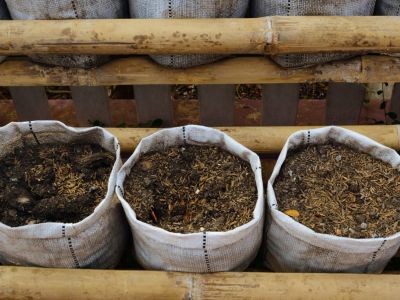Although you can find reusable composting sacks made from sturdy material, you can save a few bucks by making a bag of compost in a sturdy garbage bag. Read on for a basic compost bag DIY.
Compost Bag DIY: Can I Make Compost In A Bag?
Compost made using a couple of large, sturdy, black plastic garbage bags is great for a small amount of material. But keep in mind, making compost in a bag probably isn’t the best idea if you’re planning on making a lot of compost. To make a bag of compost, layer one part “brown” material, one part “green” material, and one part soil in the bag, along with a little finished compost to get things started. Add enough water to moisten the mixture. Tie the top of the garbage bag securely, then put it in the second garbage bag, and tie it. (Double-bagging will help to prevent the bag from splitting). Put the compost garbage bag in a sunny spot and give it a good shake every couple of weeks. Open the bag after a couple of months. If the compost is crumbly and dark with a fresh, earthy odor, it’s ready to use. If it isn’t finished, leave it a few more weeks. Compost can take up to a year, depending on the weather. If your compost isn’t finished by winter, put the bag in a frost-free shed or garage.
Compost Bag Materials For Your Compost In A Bag
What materials should go into your compost garbage bag? Here are a few suggestions: Browns: You can compost dry leaves, sawdust, dryer lint, coffee filters, or paper. You can also use twigs, bark, pine needles, or straw, but be careful about materials that may poke a hole in the compost garbage bag. Greens: Materials such as tea bags, coffee grounds, eggshells, trimmings from houseplants, and fruit or vegetable scraps are all great for compost in a bag. Soil: Weed-free garden soil, preferably rich in organic material, will help the material break down faster. A scoop of finished compost will jump-start the composting process. Don’t compost: Never compost cat or dog waste, meat, grease, fat, oil, diseased plant debris, weeds, or sawdust from pressure-treated wood.
A Note About Biodegradable Compost Bags
Be careful about biodegradable compost bags, which are intended for temporary use. Because they’re biodegradable — made of materials like starches, vegetable oils, plant fibers, or biodegradable polymers — they won’t hold up long enough to make finished compost. This doesn’t mean, however, that biodegradable bags don’t have a purpose. The bags are great for lining a countertop compost bin or under-the-sink compost pail. Toss the bags in your regular outdoor compost pile or bin every few days, where they will decompose along with the contents of the bag.
